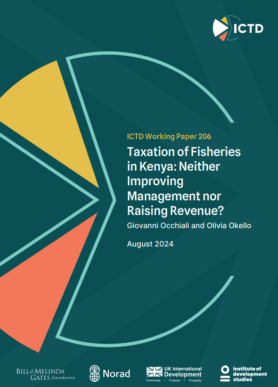Working Paper 206
The Kenyan government believes fisheries have significant potential for development. Yet their development faces many challenges – some of which are connected to a lack of the data needed to ensure their effective management. We do not, for example, have reliable information on the total annual catch. It is therefore impossible to establish whether the existing system of levies and charges is broadly right from the perspective of revenue collection and long-term sustainability of fisheries. This study uses a review of guiding legal documents, in-depth interviews, and analysis of data on domestic taxes collected by the Kenya Revenue Authority.
We conclude that the current taxation of fisheries in Kenya does not contribute to either their effective management or generating revenue. This is due to a combination of: (a) a fragmented regulatory and legislative environment, leading to unclear institutional mandates; (b) the inappropriate use of levies and charges purely to raise revenue rather than to ensure sustainable harvests; (c) little attention to sector compliance with general tax obligations, including registration, filing, and payment of taxes such as income tax or value added tax (VAT). These problems are deep-rooted, and connected to the existing legal, institutional, and operational framework. There are some immediate policy steps that could be taken to realise more of the potential for development of the sector. These include ensuring better coordination between national and county-level governments and institutions, and focusing efforts to enforce tax collection on the richest actors in the value chain.
